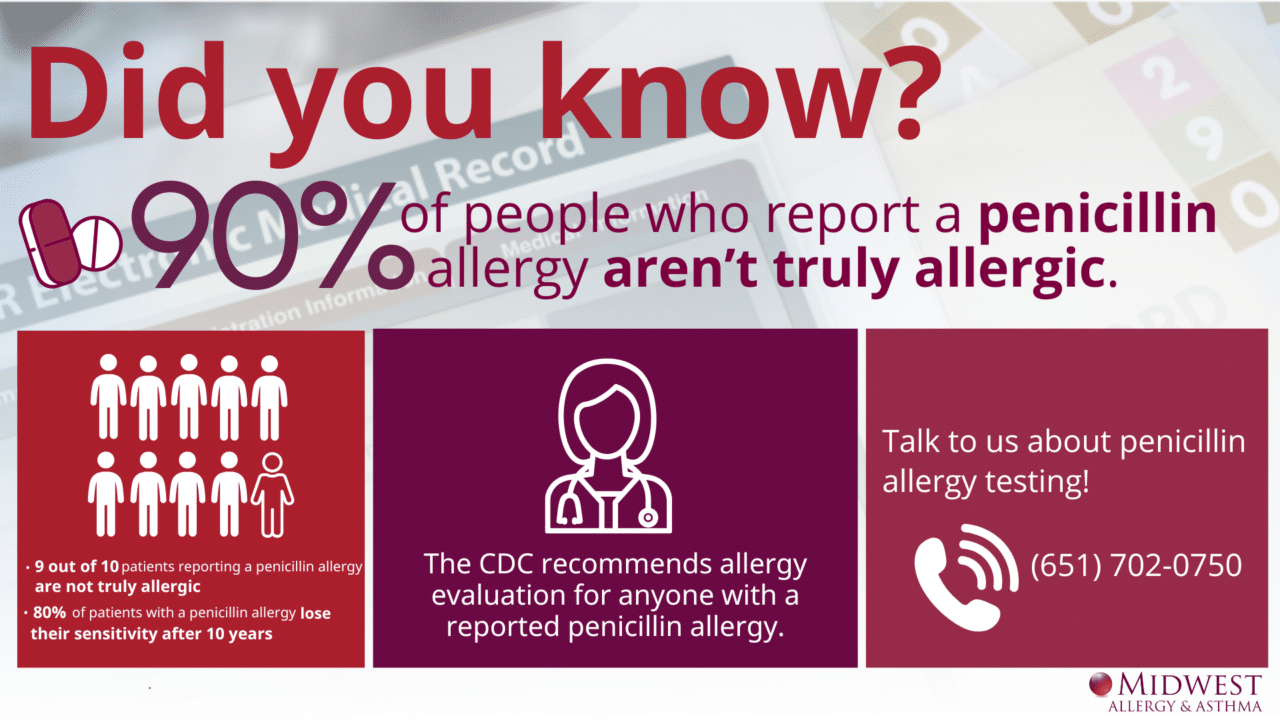
What is a Penicillin Allergy?
A penicillin allergy occurs when the immune system overreacts to penicillin antibiotics, leading to symptoms such as rash, hives, swelling, or, in rare cases, anaphylaxis. However, many people who believe they are allergic to penicillin may not actually be allergic.
Understanding Penicillin Allergy
Penicillin allergies are often diagnosed in childhood, sometimes due to reactions that were actually caused by viral infections rather than the antibiotic itself. Additionally, even individuals with a true penicillin allergy may lose sensitivity over time. Research shows that over 90% of people labeled as penicillin-allergic actually test negative upon evaluation.
Since penicillins are some of the safest and most effective antibiotics, it is important to confirm whether an allergy truly exists. Incorrectly avoiding penicillins can lead to the use of broader-spectrum antibiotics, which may be more expensive, less effective, and increase the risk of antibiotic resistance or hospital-acquired infections.
Symptoms of Penicillin Allergy
Reactions to penicillin typically occur within an hour of taking the medication. Common symptoms include:
- Mild to moderate reactions:
- Hives (raised, itchy rash)
- Swelling of the face, lips, tongue, or extremities (angioedema)
- Severe reactions (anaphylaxis):
- Swelling of the throat, causing difficulty breathing
- Wheezing, coughing, or chest tightness
- Dizziness or loss of consciousness due to low blood pressure
Severe reactions require immediate medical attention, including epinephrine and emergency care.
Penicillin Allergy Testing
At Midwest Allergy & Asthma, we follow a structured process based on patient history and physician assessment. The testing process may include:
- Physician Consultation – A physician will review your history to determine if testing is needed. Some patients may not require testing.
- Skin Testing Appointment (if needed) – If recommended, a skin test will be performed to check for an allergic reaction.
- Oral Challenge (if appropriate) – If needed, an oral challenge (taking a dose of the antibiotic under supervision) may also be scheduled.
Depending on scheduling availability and patient needs, appointments may happen on the same day or in separate visits.
This entire process typically takes 2–3 hours and is a safe, effective way to determine whether you can take penicillin. If testing confirms an allergy but penicillin is necessary for treatment, a desensitization procedure can be performed under medical supervision.
Why Testing Matters
Having a penicillin allergy listed in your medical record can limit your treatment options. Confirming whether you are truly allergic allows you to safely receive the most effective antibiotics when needed.
Schedule an Evaluation
If you have a history of penicillin allergy, consider getting tested. Midwest Allergy & Asthma offers comprehensive allergy testing to determine if you can safely take penicillin.
Call (651) 702-0750 to schedule an appointment or learn more.
Penicillin Allergy: Frequently Asked Questions
What are the odds of getting anaphylaxis from penicillin?
The rate of anaphylaxis to penicillin is about 0.02% to 0.04%.
Can a penicillin allergy go away?
True penicillin allergies are rare, and even when they do occur, sensitivity fades over time for over 80% of patients. Many people are diagnosed in childhood, sometimes because of a reaction to the illness penicillin is treating rather than the drug itself, so the allergy may not be present years later.
Do I need an EpiPen for a penicillin allergy?
You only need an EpiPen if an allergy test confirms a severe Penicillin sensitivity and your allergist recommends one.
